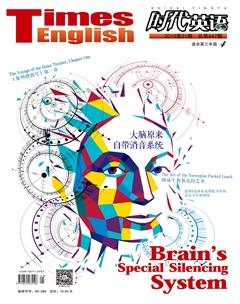Module 5 The Conquest of the Universe
詞匯短語園地
1. accustomed? ?adj.? ?習(xí)慣的
搭配:
be accustomed to (doing) sth = be used to (doing) sth? ?習(xí)慣于(做)某事
Im accustomed to the school life here now.
現(xiàn)在我習(xí)慣這兒的學(xué)校生活了。
I have been accustomed to going to bed early and getting up early for years.
我已習(xí)慣于早睡早起數(shù)年了。
accustom? ?v.? ?使……習(xí)慣于
It took a while for me to accustom myself to all the new rules and regulations.
我花了一段時(shí)間才適應(yīng)所有新的規(guī)章制度。
2. witness? ?v.? ?目擊,親眼看見;親身經(jīng)歷
Did you witness the accident?
你親眼看到那場事故了嗎?
(1) witness? ?v.? ?作證(常與against,for,to等連用)
I think she will witness against him.
我認(rèn)為她會(huì)作證他有罪。
He witnessed to having seen the man enter the building.
他作證說曾看到此人走進(jìn)大樓。
(2) witness? ?n.? ?目擊者;見證人
He was one of the witnesses at our wedding.
他是我們婚禮的證婚人之一。
be (a) witness to sth? ?目擊某事發(fā)生;為某事提供證據(jù)
bear/give witness (to sth)? ?為……作證;證明
3. assume? ?v.? ?假定,假設(shè)
搭配:
(1) assume + sth/that從句? ?假定、認(rèn)為……
We cant assume anything in this case.
在這種情形下我們無法做出任何揣測。
I assume that you always get up at the same time.
我想你總是在同一時(shí)間起床。
(2) assume sb/sth to be...? ?假設(shè)某人/某物是……
Hes not such a fool as you assumed him to be.
他并非你所認(rèn)為的那樣愚蠢。
assumption? ?n.? ?假定,假設(shè)
on the assumption that... / assuming that...? ?假定……
Assuming that/On the assumption that the proposal is accepted, when are we going to get the money?
假定這個(gè)建議被采納,我們何時(shí)能拿到錢?
4. patience? ?n.? ?耐心
The work requires both skill and patience.
這項(xiàng)工作既需要技術(shù)又需要耐心。
搭配:
be out of patience with? ?耐不住…… ;對…… 忍無可忍
have no patience with? ?對……不能容忍;對…… 沒有耐心
have patience to do sth? ?做某事有耐心
be patient with sb? ?對某人有耐心
be patient of sth? ?忍耐某事
patiently = with patience? ?耐心地
5. burst? ?v.? ?爆炸
I carry a spare tyre in the boot of the car in case one bursts.
我?guī)Я艘粋€(gè)備用輪胎放在后備廂里,以防爆胎。
burst into tears/laughter/cheers? ?突然大哭/大笑/歡呼起來
burst out crying/laughing/singing? ?突然哭起來/笑起來/唱起來
burst into the room? ?闖入屋里
burst with anger? ?勃然大怒
burst with joy/happiness? ?非常高興
burst in? ?突然插嘴;打斷
burst open? ?(使)猛然打開
6. acknowledge? ?v.? ?承認(rèn);認(rèn)為
搭配:
(1) acknowledge+sth/that從句? ?承認(rèn)……
(2) acknowledge doing...? ?承認(rèn)做過……
(3) acknowledge... as/to be...? ?認(rèn)為……是……(常用于被動(dòng)形式)
(4) Its widely/universally acknowledged that...? ?大家普遍認(rèn)為……
They acknowledged their responsibility for the bombing. =They acknowledged that they were responsible for the bombing.
他們承認(rèn)對這起爆炸事件負(fù)責(zé)。
Zhang Yimou is acknowledged as one of the best movie directors in China nowadays.
= Its acknowledged that Zhang Yimou is one of the best movie directors in China nowadays.
張藝謀被公認(rèn)為是中國當(dāng)今最優(yōu)秀的電影導(dǎo)演之一。
acknowledge? ?v.? ?告知(收到);感謝
She walked right past me without acknowledging me.
她從我身旁走過,連個(gè)招呼也沒打。
His long service with the company was acknowledged with a present.
公司送他一份禮物,答謝他為公司的長期服務(wù)。
7. defeat? ?n.? ?失敗
I never consider the possibility of defeat.
我從未考慮有失敗的可能性。
defeat? ?v.? ?擊敗;戰(zhàn)勝
辨析:
比較beat, defeat和win
(1) beat和defeat都表示在戰(zhàn)斗或競賽中“戰(zhàn)勝、擊敗(對手)”,后接競爭對手。
The news that he has been defeated/beaten in the election is not true.
他在大選中被擊敗的消息不屬實(shí)。
(2) win“戰(zhàn)勝、贏得”,其賓語通常是比賽、戰(zhàn)爭、獎(jiǎng)品或表尊重、崇拜之類意義的詞。競爭對手不能作其賓語。
win a game/match/race? ?在游戲/比賽/賽跑中獲勝
win a gold medal? ?(在比賽、競賽中)贏得金牌
win support? ?贏得支持
8. accuse? ?v.? ?指責(zé)
搭配:
accuse sb of sth/doing sth? ?控告某人某事/做某事
The police accused him of murder.
警方指控他謀殺。
She accused him of stealing her watch.
她控告他偷她的表。
辨析:
比較accuse, charge和blame
(1) accuse指當(dāng)面指控或指責(zé),不一定訴諸法庭。
(2) charge指因犯較大錯(cuò)誤或重大罪行而進(jìn)行正式法律控訴,可構(gòu)成charge sb with sth的搭配,意思是“控告某人某事”。
The police are going to charge him with murder.
警察準(zhǔn)備控告他謀殺。
(3) blame指對不好的事物或?qū)ψ鲥e(cuò)事的人給予責(zé)備,可構(gòu)成blame sb for (doing) sth或sb is to blame for sth的搭配。
The driver was to blame for the accident.
這起交通事故的責(zé)任應(yīng)歸責(zé)于這個(gè)司機(jī)。
9. relief? ?n.? ?安慰;寬慰
To my great relief, I wasnt late.
我慶幸的是沒有遲到。
搭配:
Its a great relief to do sth? ?做某事讓人寬慰
Its a great relief to find you here.
見到你在這兒我就放心了。
to ones relief? ?使某人感到慶幸或?qū)捨康氖?/p>
in relief? ?如釋重負(fù)地
bring/give relief to? ?給…… 帶來寬慰
10. consult? ?v.? ?咨詢;請教
搭配:
consult sb about sth? ?就某事向某人征求意見
He consulted his lawyer about the case.
他就此案向律師做了咨詢。
consult a doctor? ?看醫(yī)生
consult with sb? ?與某人商量
consult a map/dictionary? ?查閱地圖/詞典
consult ones notes? ?查看某人的筆記
11. in spite of? ?不管
In spite of the heavy snow, he drove downtown.
盡管下著大雪,他還是開車去了城里。
搭配:
in spite of/despite the fact that...? ?不管…… 的事實(shí)
辨析:
比較in spite of和although/though
in spite of是介詞短語,后接賓語。although/though是連詞,后接從句。
They had a wonderful holiday in spite of the bad weather.
= They had a wonderful holiday though/although the weather was bad.
盡管天氣不好,他們還是度過了一個(gè)美好的假期。
regardless of? ?不管;不顧
12. set out? ?開始做;著手進(jìn)行
搭配:
set out to do sth = set about doing sth = get down to doing sth
著手、開始做某事
At five in the morning he set out to do (set about doing) his work.
清晨五點(diǎn)他就開始工作。
set out for = set off for = leave for? ?動(dòng)身去……
Having said goodbye to their friends, they set out (set off) for Paris.
他們向朋友告別后,就動(dòng)身去巴黎了。

